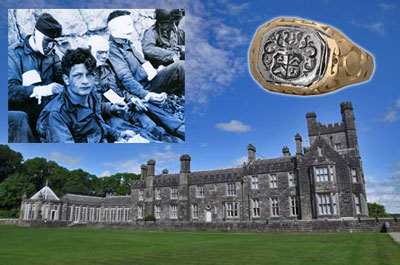
“I’m Mrs. Jennings,” I said uncertainly, praying that something clever would come out of my mouth. “I was a nurse at Dover, and I had a message from a friend of your son’s,” I paused, while he looked at me expecting more. “He never made it.”
“If it was that swine Jarroby, he’s better off dead,” he snarled at Carrington, who looked through him with practiced calm. “Poisoning my son with these notions—”
“He is dead,” I heard my own voice suddenly pipe up. “He died that night at Dover, from a wound fighting off the Germans in Dunkirk. He was a brave soldier and deserves to be remembered as such.”
“He deserves to be remembered as nothing but a degenerate. He should have been hung.”
“And yet it was alright that he gave his life — his life! — for his country? Why can’t you take off your blinkered glasses and see what is in front of your eyes? The man was nothing but a boy, trying to fight, trying to stay alive, helping you and your country survive live for another day. And you would take all of that away from him, because of the way he feels.”
Carrington’s look of complete alarm brought me back to earth with a bump. I was never going to convince this tyrant of anything. I just needed to get out and stop making it all worse for Carrington. We all knew that as soon as the door was closed behind me, that poor young man would be chastised and vilified and denigrated until his life was hardly worth living either.
“I think you should leave now,” the Viscount said dismissively. “I don’t know who you are, but I heartily suggest that you learn some manners, my good woman.”
“And I suggest that you learn some humanity,” I snapped. “Who are you to tell people how they should live their lives, while still expecting them to lay their lives down for you and your set? This war has changed it all now. You can ‘my good woman’ me as much as you like, but you don’t hold all the cards any more, you men, you aristos. This war has made us all the same.”
“Get out of my house,” he bellowed, his arm shooting out to point at the huge front door. “Get out this instant.”
I took a brief look at Carrington, pensive, measured, silent, and then strode for the door.
The despicable butler was now holding it open for me, and I sailed straight out and walked down the majestic stone staircase to the driveway. Exemplary lawns metered out on either side, beyond which the rolling Downs closed in on one side and the gold and green seamless expanse of the Kent Wield on the other. On the horizon the sea shimmered translucent; who would ever think there was so much evil waiting on the other side? The air was suffused with bees and birds and the syrupy sweetness of summer: how beautiful this world can be. How lucky we are to be here, for however long we have.
I took the bus back to Chilbury, uneasy about the way that I had left things with Viscount. He could land me in a lot of trouble if he let on that I knew about it all, although he was unlikely to implicate his own son. But anyone could hand me in if they found out. What was I thinking, opening my big mouth like that?
And what about Carrington? That poor, devastated young man! How would he go on, living with the Viscount? Meeting him, having briefly known Jarroby, made me wonder why everyone makes so much fuss about homosexuals: surely they’re not so terribly wrong? And isn’t love between two people better than hatred, in this world of violence and mourning? There seemed to me a fragile beauty in their love that survived through this poisonous war. Even though one of them hadn’t.
When I reached Chilbury, just as the sun was stretching long shadows over the woods and the square, I decided to visit the old church to see if that would settle me. I had found that I ended up in the church more and more these days, waiting for the silence to seep inside. I slipped through the tumbledown graveyard and into the arched double doors, and slid into the wooden pew at the back. I just sat quietly for a while, collecting my thoughts without fear of them spreading through my brain and taking me hostage.
I felt as if my view of the world has pivoted, the pieces in a new juxtaposition. Fancy me giving a viscount a few strong words! And defying the law — taking a decision into my own hands to help this wounded young man. Everything had been turned around by the war, all the unfairness made grimly plain. It had given us everyday women a voice — dared us to stand up for ourselves, stand up for others. We had less to lose in this world of chaos and death, after all.
I walked back out into the darkening graveyard, the mellow evening air rich with wild lavender and hawthorn. As I came to the square, I wasn’t especially surprised to see a police constable from Litchfield waiting for me. A black Bentley was parked on the curb, the Viscount’s butler sitting in the driver’s seat watching on complacently. My heart sank. The malevolence and pride of these people was ruthless, clinging hold of their advantage in the face of our total annihilation. Human nature defeats me sometimes; how greed and spite and revenge can meander so vindictively between the utmost courage and sacrifice in our hapless species.

